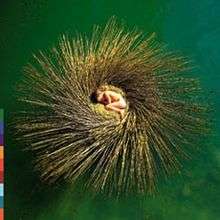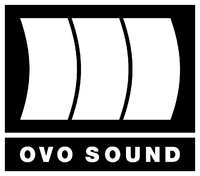
Nosferatu
Nosferatu, eine Symphonie des Grauens (translated as Nosferatu: A Symphony of Horror; or simply Nosferatu) is a 1922 German Expressionist horror film, directed by F. W. Murnau, starring Max Schreck as the vampire Count Orlok.
The film, shot in 1921 and released in 1922, was an unauthorized adaptation of Bram Stoker's Dracula, with names and other details changed because the studio could not obtain the rights to the novel (for instance, "vampire" became "Nosferatu" and "Count Dracula" became "Count Orlok"). Stoker's heirs sued over the adaptation, and a court ruling ordered that all copies of the film be destroyed. However, a few prints of Nosferatu survived, and the film came to be regarded as an influential masterpiece of cinema. As of 2015, it is Rotten Tomatoes' second best-reviewed horror film of all time.
Plot
Thomas Hutter lives in the fictitious German city of Wisborg. His employer, Knock, sends Hutter to Transylvania to visit a new client named Count Orlok. Hutter entrusts his loving wife Ellen to his good friend Harding and Harding's sister Annie, before embarking on his long journey. Nearing his destination in the Carpathian mountains, Hutter stops at an inn for dinner. The locals become frightened by the mere mention of Orlok's name and discourage him from traveling to his castle at night, warning of a werewolf on the prowl. The next morning, Hutter takes a coach to a high mountain pass, but the coachmen decline to take him any further than the bridge as nightfall is approaching. A black-swathed coach appears after Hutter crosses the bridge and the coachman gestures for him to climb aboard. Hutter is welcomed at a castle by Count Orlok. When Hutter is eating dinner and accidentally cuts his thumb, Orlok tries to suck the blood out, but his repulsed guest pulls his hand away.
Nosferatu (word)
The name "Nosferatu" has been presented as possibly an archaic Romanian word, synonymous with "vampire". However, it was largely popularized in the late nineteenth and early twentieth centuries by Western fiction such as Dracula, and the film Nosferatu. Suggested etymology of the term might be derived from the Romanian Nesuferitu ("the insufferable/repugnant one") or Necuratu ("the unclean one, spiritus immundus"), terms typically used in vernacular Romanian to designate Satan (the Devil).
Origins of the name
The etymological origins of the word nosferatu are difficult to determine. There is no doubt that it achieved popular currency through Bram Stoker's 1897 novel Dracula and its unauthorised cinematic adaptation, Nosferatu, eine Symphonie des Grauens (1922). Stoker identified his source for the term as 19th-century British author and speaker Emily Gerard. It is commonly thought that Gerard introduced the word into print in an 1885 magazine article, "Transylvanian Superstitions", and in her travelogue The Land Beyond the Forest ("Transylvania" is Latin for "beyond the forest", literally "across/through the forest"). She merely refers to it as the Romanian word for vampire: "More decidedly evil is the nosferatu, or vampire, in which every Roumanian peasant believes as firmly as he does in Heaven or Hell." However, the word had already appeared in an 1865 German-language article by Wilhelm Schmidt. Schmidt's article discusses Transylvanian customs and appeared in an Austro-Hungarian magazine, which Gerard could have encountered as a reviewer of German literature living in Austria-Hungary. Schmidt's article also mentions the legendary Scholomance by name, which parallels Gerard's "Transylvanian Superstitions". Schmidt does not identify the language explicitly, but he puts the word nosferatu in a typeface which indicates it to be a language other than German.
Nosferatu (band)
Nosferatu is an English second wave gothic rock band. In 2014 the members are Tim Vic (vocals and guitar), Gonzo (vocals), Damien DeVille' (lead guitar), Stefan Diablo (bass) and Belle Starr (drums).
History
Nosferatu was formed in March 1988 by Damien DeVille, Vlad Janicek, and Sapphire Aurora. Janicek played bass guitar/keys until November 1994, and designed the first Nosferatu Logo and stage sets. Aurora provided vocals until April 1990, after which Gary Ash (Gary Clarke) sang briefly with the band until October of that year. In 1991 vocals were provided by Louis DeWray, who remained until April 1993. Chris Clark joined the band briefly in 1994 on drums. Niall Murphy then sang with the band until November 1994, and Dominic LaVey provided vocals from March 1995 to February 2002.
Louis DeWray returned as a vocalist in 2003, having performed in the meantime with Fashionable Living Death and his own band Ditzy Micro. He also played guitar, bass, keyboard and percussion in the band at various times until December 2014. He also contributed to the songwriting and instrumentation of the 2011 Wonderland album, which was developed over a seven year period.

OVO
OVO is the soundtrack to the Millennium Dome Show in London that was composed by the English rock musician Peter Gabriel. It was his eleventh album overall. It was released on 12 June 2000 and features guest vocals by Neneh Cherry, Rasco, Richie Havens, Elizabeth Fraser, and Paul Buchanan (of The Blue Nile). Two versions of the album were released, a limited edition version, which was sold at the Millennium Dome and at petergabriel.com, and a standard version which was sold in stores. The limited edition version which was discontinued after 2000, includes a comic book telling the OVO story and a bonus disc with the track, "The Story of OVO".
Gabriel performed "Father, Son", "The Tower That Ate People", "White Ashes", and "Downside Up" over the course of the Growing Up and Still Growing Up tours. Melanie Gabriel provided backing vocals for "Downside Up". These performances are available on the Growing Up Live and Still Growing Up: Live & Unwrapped DVDs. "Downside-Up" and "The Nest That Sailed The Sky" were performed as part of The New Blood Tour in 2010 and 2011, the former as a duet between Peter and Melanie Gabriel and the latter as the closing, orchestra-only track of the show. "Father, Son" was also performed. These performances are available on the New Blood Live In London DVD.

Ovo (Cirque du Soleil)
Ovo is a touring circus production by Cirque du Soleil and premiered in Montréal, Canada, in 2009. Ovo's creator and director, Deborah Colker, took inspiration from the world of insects. The idea for Ovo was not to be about the acts, nor dancing, nor insects, but about movement. The movement of life permeates the entire show with creatures flying, leaping, bounding, and crawling. Composer Berna Ceppas brought additional life to Ovo with a score inspired by the music of Brazil. ovo means "egg" in portuguese and represents the underlying thread through the show. Graphically, inside the logo of Ovo, is an insect. The two O's represent the eyes and the V forms the nose and antennas.
History
During late April 2011, Ovo had to cancel performances in Ohio due to flooding at Coney Island. The Ohio River began flooding due to heavy rains over the period of a few days. The team had been running pumps, adjusted parking, as well as the show's layout, but finally did have to cancel multiple performances (April 22 - May 1, 2011).

OVO Sound
OVO (October's Very Own) Sound is a Canadian record label founded by rapper Drake, his longtime friends and producer Noah "40" Shebib and Oliver El-Khatib in 2012. The label is based in Toronto, Ontario. OVO Sound consists of Drake and in-house producers 40, Boi-1da, T-Minus, Mike Zombie, Nineteen85 along with recording artists PartyNextDoor, Majid Jordan, Yusuf Sota, ILoveMakonnen, Roy Woods. The label's releases are currently distributed by Warner Bros. Records.
History
Starting in 2006, Drake's early mixtapes such as Room For Improvement and Comeback Season were released under the unofficial record label, "October's Very Own" as he was unsigned at the time. Drake then began building up his October’s Very Own brand by shouting out to OVO on his songs, releasing music and selling OVO merchandise on their website.
The record label was then officially founded in 2012 by Drake and Noah "40" Shebib. According to Billboard, Drake shortly signed a partnership deal with Warner Bros. Records with the label. Similar to how Rick Ross is signed as a solo artist to Epic Records and his artists on his Maybach Music Group label are signed to Atlantic Records (formerly signed to Warner Bros. Records), Drake will still be signed as a solo artist to Republic Records through Young Money/Cash Money, but the artists he signs to OVO Sound releases will be distributed through Warner Bros. Records.
Podcasts:

